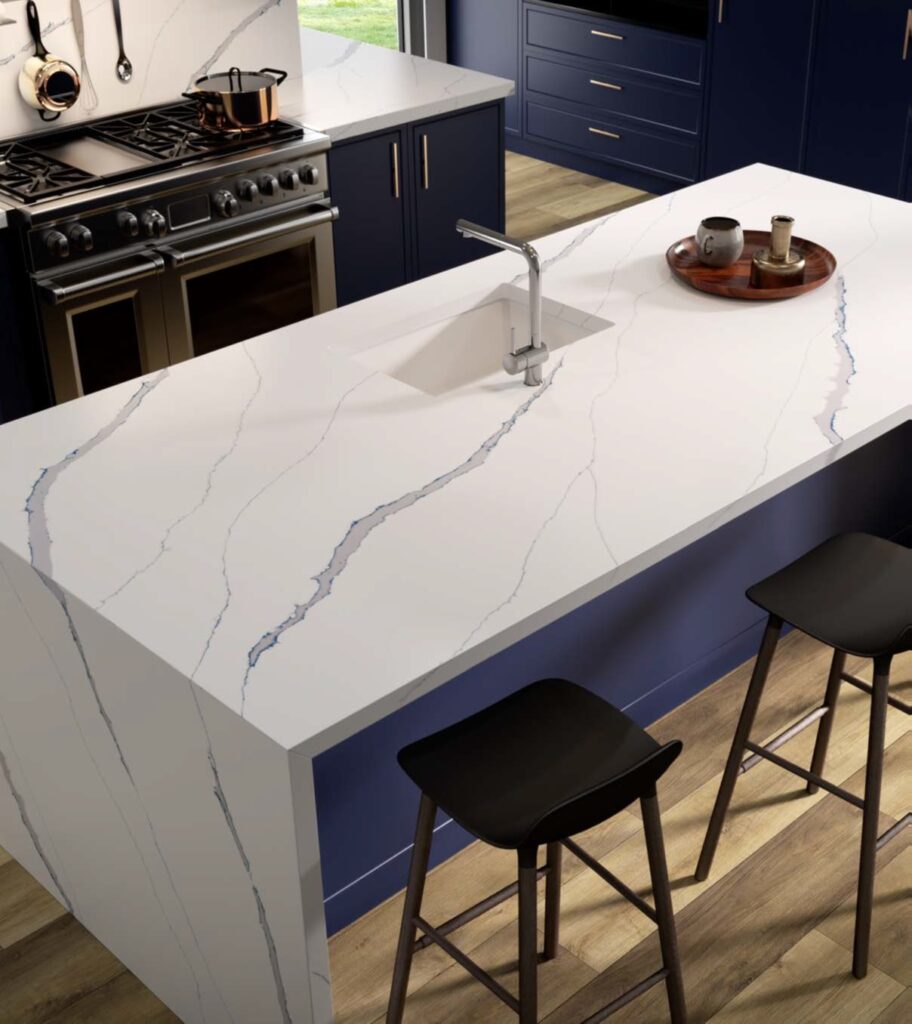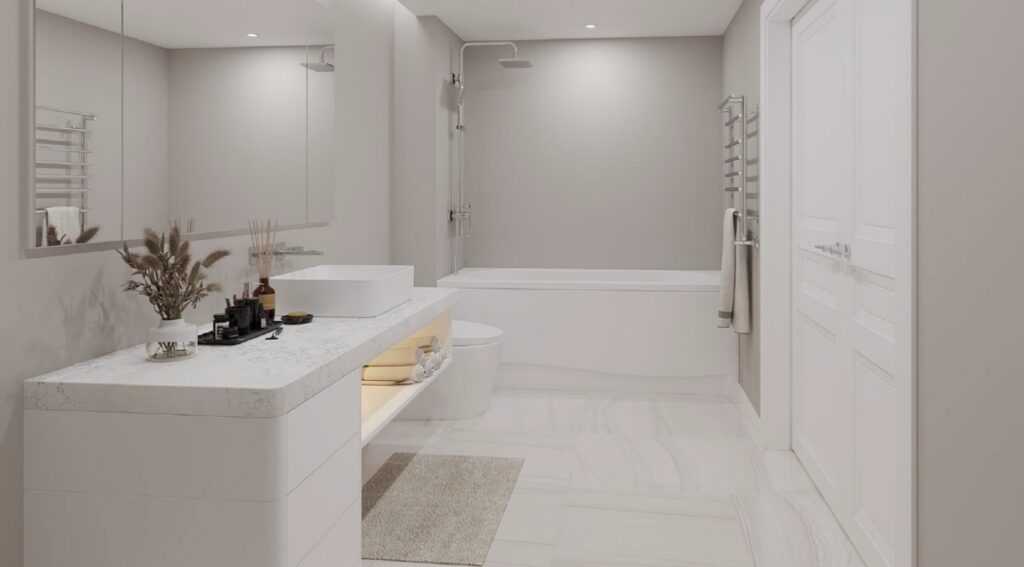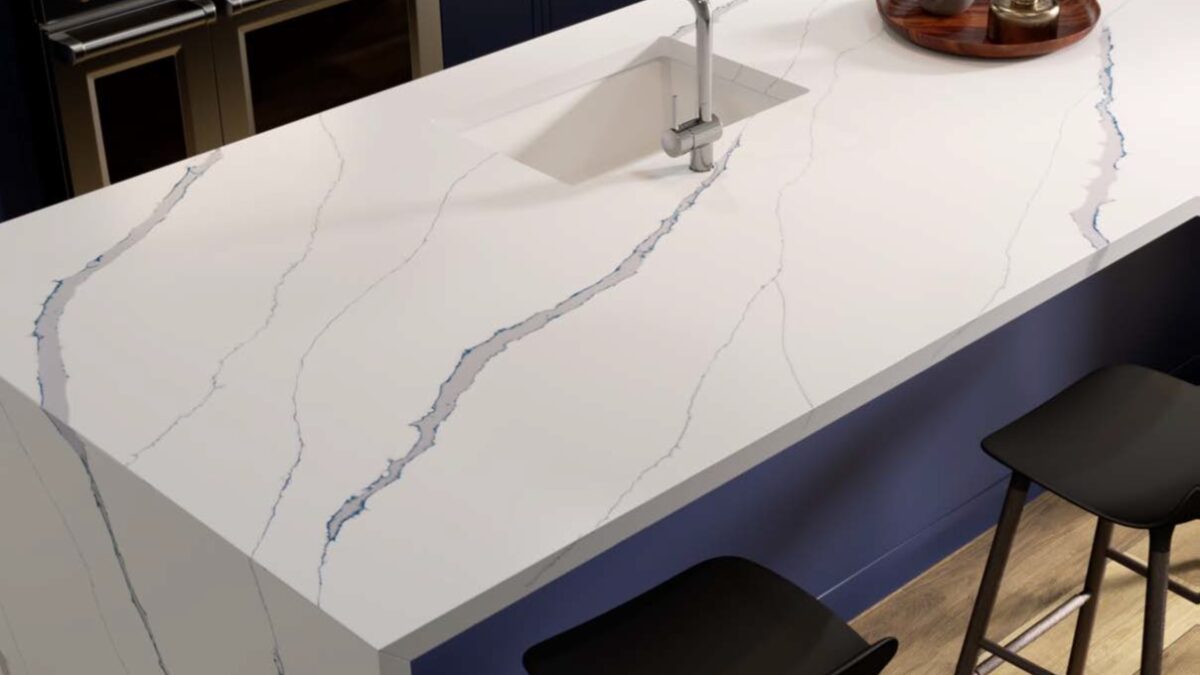What Is Quartz?
Quartz is the most popular material for a bathroom vanity, it’s even more popular than marble. This article will explain why.

Quartz countertops are man-made surfaces combining the best of natural stone with cutting-edge manufacturing. Using crushed quartz crystals, along with resin and pigments, quartz is designed to replicate a natural stone look.
Quartz countertops are non-porous and resist scratches and stains, creating a surface that’s on par with marble while offering greater durability.
What Is Marble?
Marble is a naturally occurring metamorphic rock. It is created as a result of a combination of rocks—such as calcite, limestone, dolomite, and serpentine—being under intense pressure and temperatures for hundreds of years. The main components of marble are calcium carbonate and acidic oxide.
Marble is known for its beauty, but it is a stone that requires an applied sealant and extensive care. If marble isn’t cared for properly, it can be permanently damaged.
Quartz vs. Marble: Design Considerations
Being a natural beauty, many people are drawn to the veining and richness of marble when choosing a countertop surface. Because of the variety of color and types of veining, there are hundreds of options available. In fact, no two marble slabs are exactly alike, making every piece of marble unique. Marble fits particularly well with minimalist designs.

Quartz boasts a broad variety of patterns and colors, from bright white to green to black. It is a fashionable and popular choice for countertops, and its infinite design choices make it the perfect choice for interior projects. Some quartz has veining that makes it similar to marble, and some options contain mirror chips that reflect light. Because it requires minimal maintenance, quartz is a solid choice for kitchens and bathrooms.
Quartz vs. Marble: Durability
Because it is porous, marble is vulnerable to stains that may permeate deep into the surface—wine, juice, and oil, for example. It’s essential to have your marble countertops professionally sealed when installed—and every six months after—to prevent staining and damage. Marble scratches easily, is not heat resistant, and requires consistent maintenance to maintain its appearance and performance.
Quartz possesses extraordinary durability and doesn’t need sealing like marble does. Quartz does not stain or scratch easily. It’s possible to buff out light scratches with polish or fix deep scratches with a filler. Durability is an essential factor in choosing countertop material, especially for kitchens and bathrooms. The non-porous surface of quartz ensures there won’t be any staining, a problem that might occur after only a few months with natural marble.
Quartz vs. Marble: Cost
Marble is typically more expensive than other countertop options, and it can differ in price due to the type, thickness, color, and grade. Marble slab countertops can cost from $15 up to $190 per square foot. Marble from Carrara, Italy, is one of the least expensive natural countertop materials, mainly because it’s readily available. Rarer and luxury versions cost much more.
The price of quartz countertops depends on the style, quality, and size of the installation. The slab size will affect the overall cost of installation. Prices for quartz typically range between $10 and $30 per square foot.
Quartz vs. Marble: Maintenance
Marble countertops need routine care. Sealing is required at the time of installation and then annually after that to protect and prolong the life of the surface. Marble countertops should be cleaned frequently, with intermittent polishing. Stains may be removed with a combination of ammonia and hydrogen peroxide, but it is best to avoid acids on the surface, which can dull the shine of marble. Marble is also prone to chipping, so be careful not to hit or scratch it with heavy objects.
Quartz does not need to be sealed or resealed at installation because it’s polished during production. Frequent cleaning using a mild soap, an all-purpose cleaner, and a non-abrasive cleaning cloth will keep quartz in excellent condition. Most stains on quartz countertops can be removed with glass cleaner and a non-abrasive sponge. High heat can damage quartz countertops, so you’ll want to avoid placing a hot pan or pot directly on the countertop. Easier to maintain than marble and other stone surfaces, quartz will provide years of charming beauty and hygienic reassurance.
Why You Should Choose Quartz for Bathroom Vanity Top

Because quartz is more durable and easier to maintain than marble, it is a better choice for a bathroom vanity top. Quartz is a beautiful option to match any bathroom, and it will last for years. Quartz is also typically less expensive and easier to find. When you look closely at quartz, you can’t tell it’s manufactured. It has the luxury appeal of natural stone. Pair that with outstanding durability, strength, and hygienic properties, and it’s the ideal countertop.
Because quartz is more durable and easier to maintain than marble, it is a better choice for a bathroom vanity top. Quartz is a beautiful option to match any bathroom, and it will last for years. Quartz is also typically less expensive and easier to find. When you look closely at quartz, you can’t tell it’s manufactured. It has the luxury appeal of natural stone. Pair that with outstanding durability, strength, and hygienic properties, and it’s the ideal countertop.
VIATERA by LX Hausys uses only the finest quartz for durable and elegant kitchen, bath, and work countertops. Every quartz slab is inspected to meet our highest standards and includes up to 93% natural quartz. VIATERA’s non-porous quartz surfaces are strong, hygienic, and easy to clean and maintain.
VIATERA quartz by LX Hausys comes in five different collections, with varying colors and styles in each.
Calacatta is inspired by Calacatta Marble and offers bright, natural white backgrounds, intricate veining, and elegant patterns.
Masterpiece includes an inspiring palette of stylish hues and unique designs, with on-trend colors and both bold and subtle designs.
Musica draws inspiration from natural stone with the perfect symphony of light and dark hues with deep, rich complexity.
Urban boasts concrete-like designs lending edgy appeal with an industrial look softened by captivating marbling throughout.
Classic is made up of timeless colors drawing inspiration from the earthy and ethereal tones found in nature. From brightest to darkest, this collection offers something for everyone.
If you’re a homeowner needing assistance, we’re happy to help. Fill out a brief form and contact us today; someone will reply to you promptly. If you’re a designer or trade professional looking for samples, products, or information, our experts can assist; contact us now.

